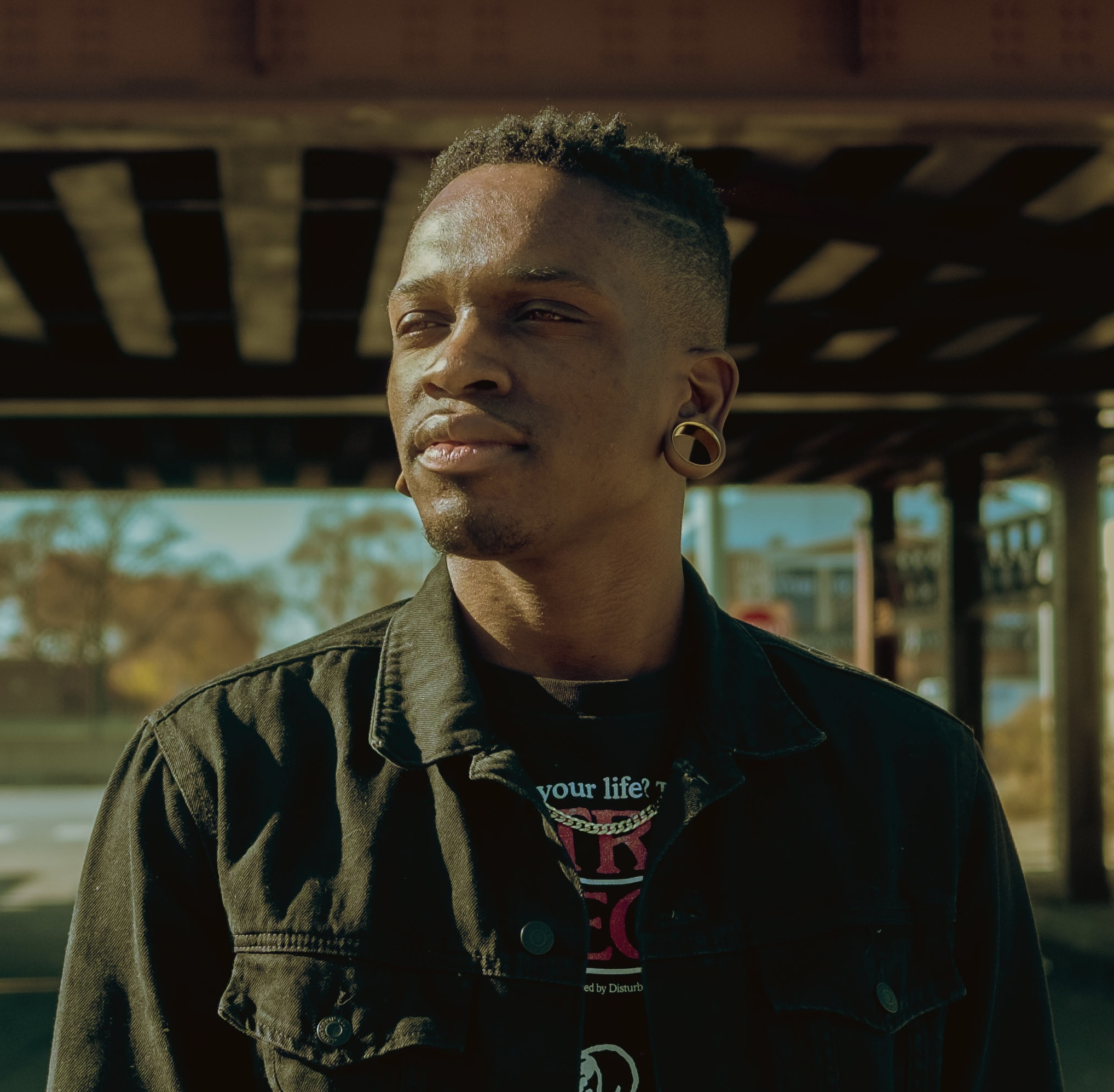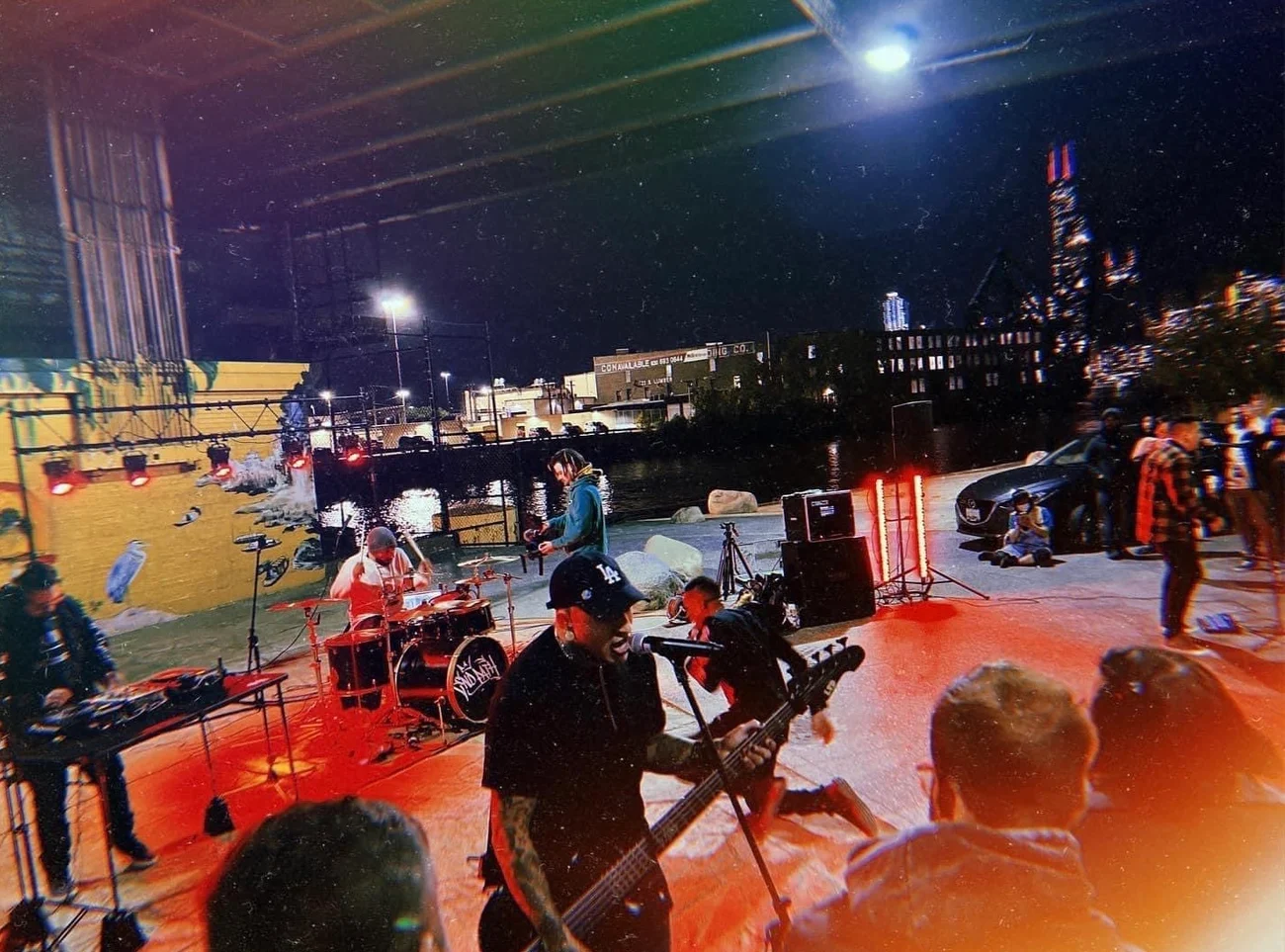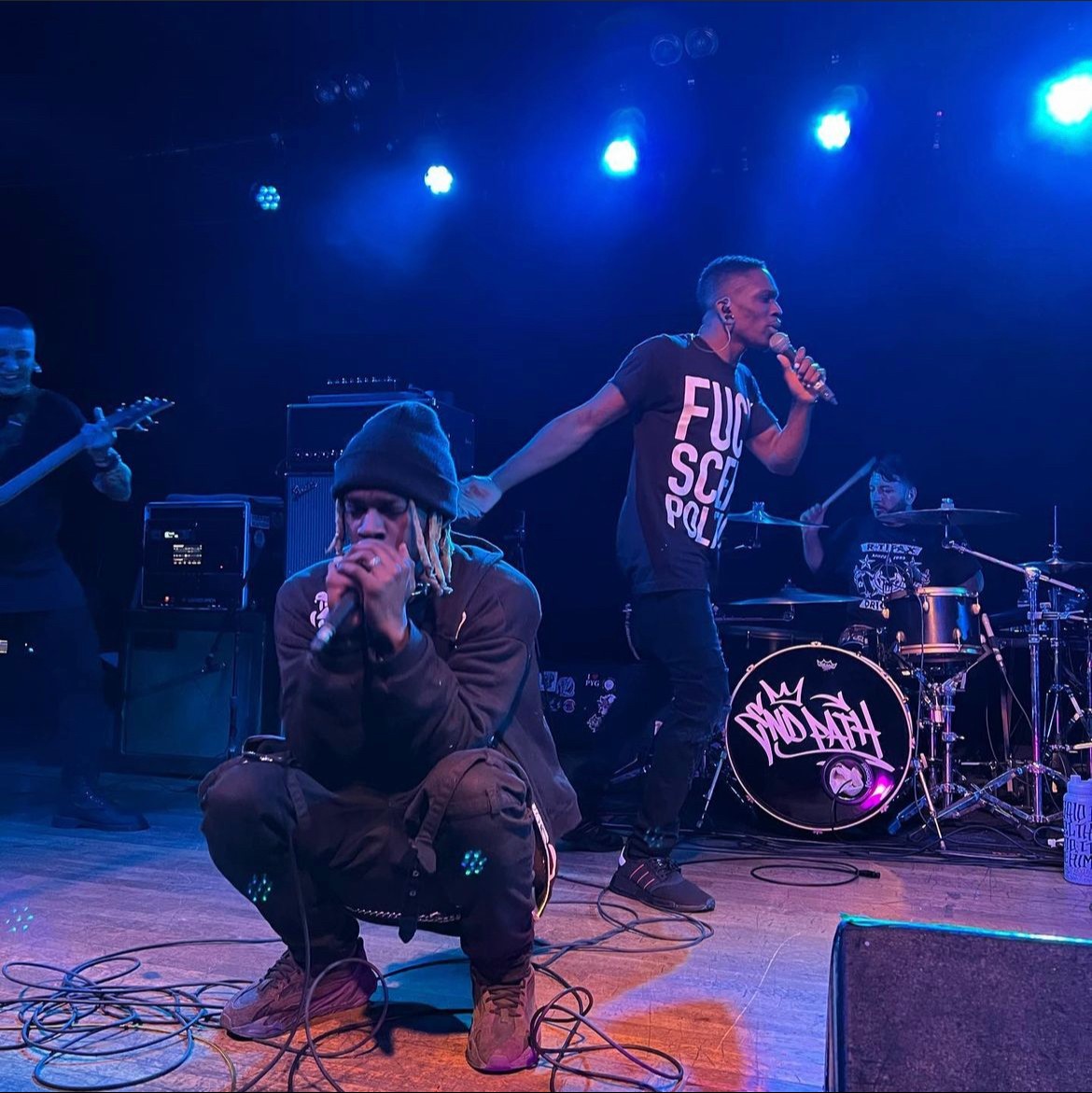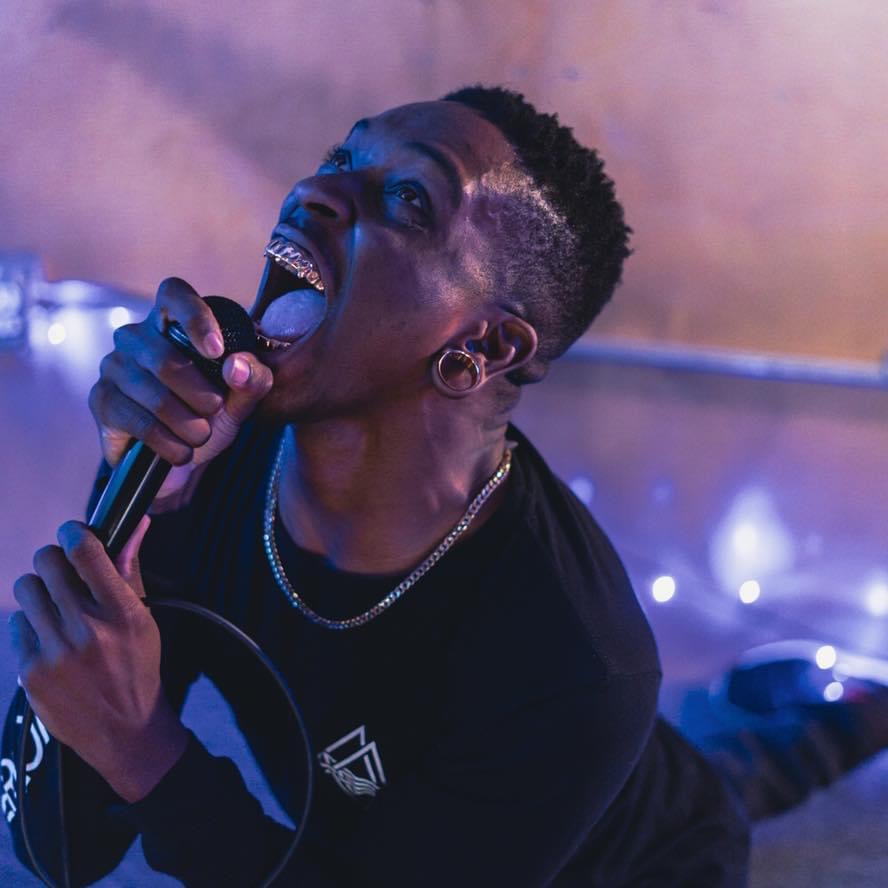We caught up with the brilliant and insightful §in a few weeks ago and have shared our conversation below.
§in, appreciate you joining us today. It’s always helpful to hear about times when someone’s had to take a risk – how did they think through the decision, why did they take the risk, and what ended up happening. We’d love to hear about a risk you’ve taken.
I appreciate the opportunity to interview with y’all. I go by §in, or SSIN. I don’t care which way you spell it. I’ve been doing music professionally for 13 years. I figured out real quick that being a musician, from my perspective, is, at its core, nothing more than a series of taking risks.
Outside of writing music, I’m putting a good amount of energy into planning ways to bring live music to DIY places that corporations can’t control.
In early 2020 (amazing timing) I started the band I’m singing in now. I feel like the story of our first show is a perfect example of the risks I had to take to make part of my vision a reality.
My band End Path is a 5-piece band from Chicago, IL. We blend a few different genres we each have love for, but the two most consistent are house and rock.
After two years of pandemic-related delays, we were finally ready to play our first show. We wanted to control the means of production. Basically I’m sayin we wanted to be sure the show was aligned with our DIY mission. We made a plan, found artists, announced it, kept working and preparing, then…it happened. Major setback number one. Close to a week before our scheduled show date: our original venue backed out.
With only a few days to find a new location, we hustled to search for alternatives. Venue after venue turned us down, citing the short notice. As our options shrank and the show date got closer, we realized we might have to take a huge risk. That’s when we decided to go full DIY and set up under a bridge or in a park.
This decision came with some serious risks, especially when it came to permits. We were basically planning to go as far as we could till we couldn’t lol. When chose a spot under a bridge in a park.
We arrived a few days later to setup and just see how long we can play till we’re shut down. When we got there, there was an actual aerobics class happening just a couple feet away from where we planned to set up. They had an instructor with a mic, a speaker system, and decently loud music playing already. It looked like it was an elderly dance class or something.
We went ahead and started setting up our stage and lights. Then, comically just as we finished…it happened. Major setback number two: a police car rolled up. I could see it on everybody’s face. Our hearts sank. They were doing a general check, looking to see if mfs had a permit.
By pure luck, the route the cops pulled into placed them closer to the aerobics class. Since they saw and heard them first, they approached the dancing grandmas. And to our luck – they actually had a permit for their class. The police left after checking their permit, never fully making it over to us.
The threat of getting shut down still hung over us the entire time tho. Ya know, just a lil looming thought that at any moment 12 could just spin the block.
We got through all that, got to sound check then….yeah BACK to BACK it happened. Major setback number three: Our first generator couldn’t handle the load of all our equipment. Our speakers kept shutting off. We couldn’t get past a sound check.
It was at that point, we all agreed we were in too deep to not keep trying. So we bought a second generator on the spot. It was a financial hit, but necessary to make the show happen.
It was our first show, and we had a great response from fans online – fans we built after learning and simultaneously running Facebook ads as a response to the pandemic. We felt it was only right to persevere and finally make this a real experience for them.
In the end, we made it work. Despite the technical difficulties. Despite the cold weather. Despite the cops. That second generator stayed solid, all acts performed without issues, hometown fans showed love and we created an overall memorable experience.
Obviously this approach isn’t sustainable for future events, but it embodied the DIY spirit crucial to our scene. It demonstrates what outcomes are possible when you input people who are wholeheartedly committed to a vision. Moving forward tho we’re focusing on more sustainable ways to create unique experiences (with permits and allat we promise lol)
I have a deep love for live music. I wanna do what I can to keep the means of production accessible to artists.

Awesome – so before we get into the rest of our questions, can you briefly introduce yourself to our readers.
For those that don’t know me, music has been woven into the fabric of my life for as long as I can remember. With the current state of the music industry, I’m not sure if that’s a blessing or a curse, but I love it all the same. My journey began around age 10, watching my two older brothers leading their own bands – singing, playing guitar, and drumming. I didn’t fully grasp their influence on me until high school, when starting my own band became an all-consuming obsession. From those high school days until now, I’ve evolved from simply wanting to join the live music space to having a vision for revolutionizing it.
The challenges facing live music today go far deeper than just creating “something fun to do.” Since Covid, we’ve witnessed the closure of countless local venues. Combine that with the systematic devaluation of music (through streaming platforms, social media, etc.), and it’s clear that revitalizing live music will require radical changes. I see two potential paths forward: either the emergence of a new genre that ignites people’s passion to create and attend shows, or a complete reimagining of how local live shows are conducted. I’m actively working toward both.
Beyond my musical pursuits, I’ve spent recent years studying real estate and contract negotiation. These skills aren’t just a side interest – they’re part of a larger vision. I plan to leverage this knowledge to transform thousands of empty commercial spaces across the United States into temporary music venues, creating new opportunities for artists and breathing life back into local music scenes.

What’s a lesson you had to unlearn and what’s the backstory?
There’s a lesson I had to learn that will always stick with me – one that’s crucial in both music and business, but I had to learn it the hard way since no one in my life knew it themselves.
During my early years of leading a band, I was truly figuring it out as I went. While I was confident in my writing, playing, and leadership, something felt off about promoting shows to people I hadn’t met (or worse, barely knew). I couldn’t place that feeling at the time. For context, this was around 2010 – social media was still evolving and promoting music was this ambiguous concept that me and my teenage friends could barely grasp. Despite my gut feeling and our lack of knowledge, we followed what everyone else seemed to be doing: mindlessly going through our social media friends lists, asking each person to buy tickets. The “common wisdom” was that it didn’t matter if they liked the music, that it was normal if it made relationships awkward – it was supposedly how everyone did things.
But it never sat right with me. What if they didn’t like our music? What if we wanted to find people specifically into our genre? Was this really how everyone was doing it? I had too many questions, and blindly following others never felt right. I’ll be brutally honest – I didn’t have many friends to ask anyway. Most were either in my band or couldn’t care less about rock/metal. But progress and effort towards the goal was all I cared about, so I swallowed my pride and asked everyone from close friends to estranged acquaintances to come “support.”
The shows had decent turnout, but after paying closer attention to who was actually showing up, I realized something that should have been obvious from the start. Had we not been putting out fires and focusing solely on performing, we would’ve seen it sooner:
Your friends AREN’T your fans.
Sure, your fans can BECOME your friends. And yes, a tiny percentage of musicians make such universally palatable music that their friends do become genuine fans. But the real lesson was that most people showing up to local shows were simply into heavy music and live shows. They went to different schools, lived in different parts of town, had different friends we hadn’t met yet. Our job wasn’t to convert people we knew into fanatics of our (at the time) obscure music – it was to find the people who already loved that music in the first place.
This realization, coupled with understanding that no one in my band or local scene really knew what they were doing, drove me to dive deep into music marketing. To this day, I do my due diligence to keep up with the ever-changing landscape of music promotion.

We’d love to hear your thoughts on NFTs. (Note: this is for education/entertainment purposes only, readers should not construe this as advice)
I think now is an amazing time to answer this question. First, let me preface this by saying that while I’m a tech enthusiast, I don’t have very deep knowledge of NFTs’ functionality or current use cases. I do, however, remember the hype around them and the gold rush that followed. From what I see, most of the hype is dead – with NFT sales dropping over 95% from their peak – along with most of the fly-by-night companies looking for a cash grab. This is a great thing, in my opinion.
Hype and business strategies aside, I was always fascinated by their potential utility for artists. NFTs can be used for ticketing, with smart contracts that can limit resale prices or ensure artists get a cut of secondary sales – something that major artists like Kings of Leon have already started experimenting with. I’ve also seen interesting developments in how they’re used for collectibles. While I’m not entirely sold on purely “digital assets,” I think it’s a cool idea to pair physical items with digital proof of ownership. Some bands are already doing this, releasing limited vinyl records that come with NFTs providing exclusive digital content or fan community access.
All things considered, I believe in a few decades, blockchain technology will be the final line of defense musicians have against big corporations squeezing the life (and money) out of their pockets. Just look at traditional streaming platforms taking 70-85% of revenue, while NFT-based music platforms typically take far less. This “crypto winter” might actually be the best thing that could have happened – it’s forced the focus away from speculation and back to actual utility for artists.
Contact Info:
- Website: https://end-path.com
- Instagram: https://ig.me/m/___ssin___
- Facebook: https://www.facebook.com/ssin666
- Youtube: https://www.youtube.com/@end_path

Image Credits
File Name – Photographer @InstagramHandle
End Path First Show Picture – Taylor Sears @TNSPhotographyLLC
SSIN Live Picture – Mike Lowy @UndefinedGraphics
SSIN Portrait – Craig Hoffman @ragbelly
SSIN Photo 1 – Tracy Conoboy @conofoto


